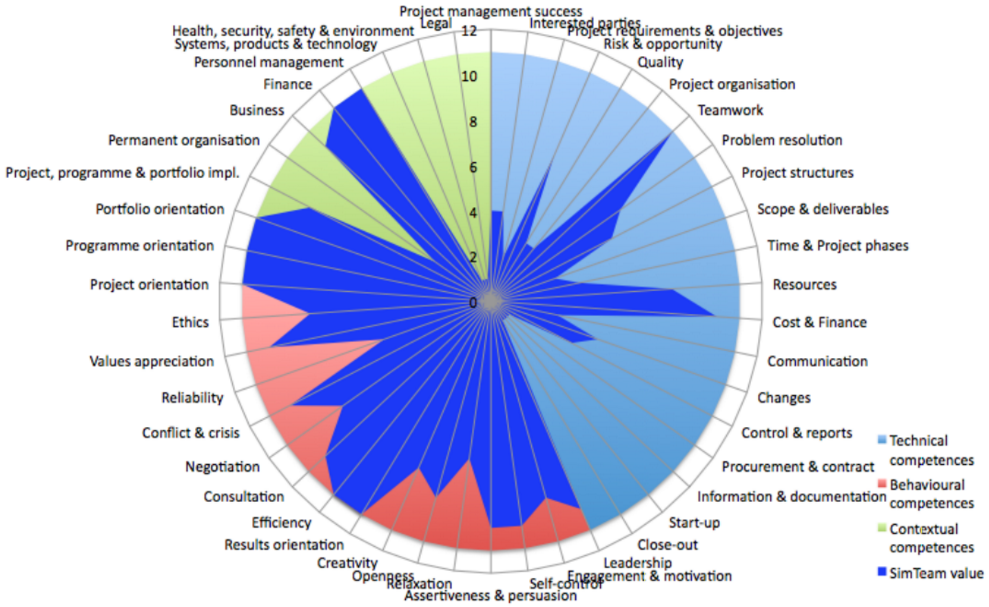Project portfolio management with Online Business Simulation
What is project portfolio management?
Project management has multiple fields: we can either manage individual projects, or a set of related projects, or a portfolio of different projects. Project portfolio management basically consists of starting the right projects at the right times to match the company’s available resources so that all projects are completed on time. If the project-based organization can identify, categorize, evaluate and prioritize projects and then match them with the necessary resources, they can obtain a competitive advantage.
Course objectives
ur Online Business simulation platform is well-suited for comprehensive project management education programmes (e.g. IPMA or PMI). Participants can obtain practical experience regarding certain challenges of project management. The chart below illustrates how our platform can help in Project Portfolio Management courses.

The above radar diagram gives an example of how IPMA competence dimensions can be supported by our Online Business simulation platform. There are some key areas inside the three main types of competence dimensions (technical, contextual and behavioural) where our platform has the most relevance. In the following section you can find detailed information about the compatible fields of project portfolio management. Our Online Business simulation platform is suitable for practicing the following competencies:
Technical competencies
Teamwork. The simulation is team based. Participants are grouped into teams to form a virtual company. They can fully experience this aspect.
Resource management. Human resources (hiring, assigning, training, etc.) are well demonstrated during the simulation.
Cost & finance. Project cost analysis and margin analysis is well demonstrated.
Change management. Challenges and resource related changes can be easily demonstrated, as well as preparing for and managing change.
Contextual competencies
- Project and portfolio orientation. The simulation is built on project-based enterprises with large project portfolios; therefore, it fully supports this dimension.
- Personnel management. The simulation includes the need for each company to consider its employees’ competencies, experience, and preferences. It also simulates the recruitment and development of employees.
- Finance. Complex financial and accounting functions are built into the simulation. Automated reports are provided for the participants on demand.
Behavioural competencies
Leadership. The different management roles assigned to the members of a team allow the evaluation of leadership-related challenges.
Assertiveness and persuasion. The team dynamics that arise during the simulation allow the evaluation of the participants’ assertiveness and persuasiveness.
Results orientation. The simulation fully supports the evaluation and improvement of this capability.
Efficiency. The simulation fully supports the evaluation and improvement of this capability.
Conflict and crisis. The simulation allows the use of different case studies (e.g. in the field of crisis management) that include special individual missions that interfere with other team members' missions therefore create conflicts.
Values appreciation. The scenarios allow the trainer to monitor participants in this respect and provide feedback about their behaviour. It is possible to make changes in the team and try different roles during the simulation – this helps appreciating other people’s work too.
Our platform supports the practice of other soft skills related to project management, too. In addition to the above mentioned IPMA related elements, communication and presentation exercises might also be integrated into the course. Participants can present their virtual company’s financial results and their companies’ strategy during a special presentation session.
Participant learning outcomes
After successful completion of the course, participants will be able to do the following:
- Align projects with strategic goals
- Identify, evaluate and prioritize projects
- Manage necessary resources and create the suitable resource mix
- Monitor and control project portfolios, manage changes
- Understand the importance of project controlling
Who should attend?
Managers who work for project based organizations, leaders who manage the project selection, project managers, or any individual who want to extend their knowledge in the field of project portfolio management.
Possible training outline
During the project portfolio management course, the following activities are suggested:
Theoretical introduction to project portfolio management:
- Why project portfolio management is important
- Analysing and evaluating projects
- Aligning projects with strategic objectives
- Prioritizing projects
- Matching projects with the necessary resources
- Project controlling
SimTeam practice:
- Introduction to the simulation platform
- Creating competing teams and setting targets
- Use simulation as an extended case study
- Perform focused topical exercises








